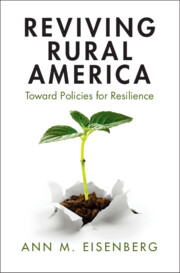Book contents
- Reviving Rural America
- Reviving Rural America
- Copyright page
- Contents
- Figures
- Acknowledgments
- 1 Introduction
- 2 The Foundational Myths
- 3 The Myth of Rural Empowerment
- 4 The Myth of Rural Unsustainability
- 5 The Myth of Rural Decline
- 6 The Myth of Rural Radicalism
- 7 The Myth of Rural Whiteness
- 8 The Myth of Rural Obsolescence
- Index
3 - The Myth of Rural Empowerment
Published online by Cambridge University Press: 20 June 2024
- Reviving Rural America
- Reviving Rural America
- Copyright page
- Contents
- Figures
- Acknowledgments
- 1 Introduction
- 2 The Foundational Myths
- 3 The Myth of Rural Empowerment
- 4 The Myth of Rural Unsustainability
- 5 The Myth of Rural Decline
- 6 The Myth of Rural Radicalism
- 7 The Myth of Rural Whiteness
- 8 The Myth of Rural Obsolescence
- Index
Summary
This chapter seeks to debunk the myth that rural disadvantage does not exist, or is unworthy of investigation, because rural populations hold disproportionate political power. Noting other scholars’ efforts to challenge common assumptions regarding rural voters’ inordinate power in legislatures and the Electoral College, the chapter takes an alternate approach by exploring widespread challenges rural local governments have encountered in the face of economic transformation over the past several decades, which, for some regions, has come with regional depopulation, high rates of property vacancy, broad socioeconomic distress, and strains on municipal and county budgets. Officials in distressed local governments often struggle to provide even the basic services needed to keep a community afloat, such as enforcement of the building code. Rural local governments’ struggles challenge the stereotype of the overly empowered, enraged, conservative rural voter holding the rest of the country hostage to his political whims. The story this chapter tells is one of a shrinking public sphere, the limits of law’s efficacy in places with few resources, the role property plays in regional prosperity, local efforts to work with little to achieve what they can, and the national abandonment of places no longer deemed useful for extractive purposes.
Keywords
- Type
- Chapter
- Information
- Reviving Rural AmericaToward Policies for Resilience, pp. 47 - 74Publisher: Cambridge University PressPrint publication year: 2024

